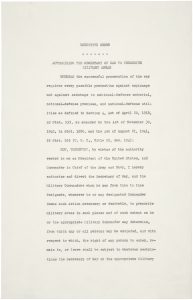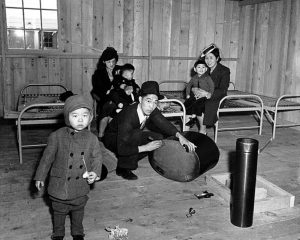A few years following the start of World War II in 1939, and just ten weeks after the Japanese bombed Pearl Harbor, President Roosevelt enacted Executive Order 9066 in 1942. From 1942 to 1945, the policy authorized the U.S. government “to prescribe military areas in such places and of such extent as he or the appropriate Military Commander may determine, from which any or all persons may be excluded” (National Archives). That is, the Order was designed to prevent espionage on American soil. While the legislation did not explicitly describe the “persons” to be detained, the Pacific west coast at large soon became a militarized area, which contributed significantly to the forceful relocation of over 120,000 men, women, and children of Japanese descent (including Yamada’s family) in the months following its enactment (Our Documents).

The first page of Executive Order 9066, signed by President Roosevelt on February 19, 1942 (National Archives)
Yamada’s family in particular was sent to “Camp Harmony,” a euphemism for the internment camp established at an assembly center in Puyallup, Washington. Below is a curated selection of poems from Yamada’s Camp Notes and Other Poems, which includes, as the title suggests, poems in which Yamada writes of the pain-filled experiences that defined her life in internment. The succinct, honest style of her poetry beautifully captures the rawness of this pain.

Japanese American evacuees, Camp Harmony (Puyallup Assembly Center), 1942 Photo by Howard Clifford, Courtesy UW Special Collections (UW526) (Fiset)
In the poem “Evacuation,” as disturbing as it is brief, Yamada illustrates America’s disgust towards the Japanese during the World War II era. Photos taken of Japanese prisoners by the press, capturing the prisoners’ forced smiles as they boarded buses to the internment camps, were captioned: “Note smiling faces / a lesson to Tokyo” (“Evacuation” 13-14). Yamada then writes in the poem “On the Bus” how she could only watch, helpless, as her father was forcefully arrested and separated from his family by the FBI, under the suspicion of “Possible espionage or / Impossible espionage. / I forget which” (“On the Bus” 9-11). Thus, in so few lines, Yamada captures the absurd inhumanity of internment, as the U.S. government began detaining Japanese Americans, like Yamada’s father, apparently at random on the single basis of race.
In “Block 4 Barrack 4 ‘APT’ C,” Yamada depicts the dry, isolated landscape of the internment camps, through such expressive imagery as “These sinewed branches / [which] were rubbed and polished / shiny with sweat and body oil” (“Block 4 Barrack 4 ‘APT’ C” 8-10). Yamada personifies the ubiquitous, maddening despair felt in solidarity by the prisoners, writing of the screams of a pregnant woman which emanated throughout the barracks: “Lives spilled over us / through plaster walls / came mixed voices. / Bared too / a pregnant wife . . . she sobbed alone / and a barracksful / of ears shed tears” (“Block 4 Barrack 4 ‘APT’ C” 14-23).
Next, “The Night Before Good-Bye” is a deeply somber poem, depicting the internment’s barbaric separation of families and the fear it instilled in its prisoners. The night before Yamada was to be released from internment, she receives from her mother a recently mended pair of underwear. As her mother hands the garment over, she urgently whispers, “[K]eep your underwear / in good repair / in case of accident / don’t bring shame / on us” (“The Night Before Good-Bye” 18-22).
After 18 months of internment in Camp Harmony, Yamada, in her poem “Cincinnati,” writes of her first experience upon finally being released from the camp. In the urban city, she cherishes her freedom and anonymity, writing: “no one knew me” (“Cincinnati” 8). That is until a passerby spits on her, hissing “dirty jap,” after which Yamada breaks uncontrollably into tears, realizing “Everyone knew [her]” (“Cincinnati 10-11, 41).
Contextualizing one another, the above poems not only provide an excerpted view of Yamada’s life in internment, but also demonstrate the multi-faceted wounds inflicted upon internment survivors at large. During internment, Yamada — alongside the over 120,000 people of Japanese descent sent to camps across the country — was stripped of her family, her home, her language, and ultimately, her sense of self. However, refusing to submit to the inhuman, deeply racist attitudes of this time, and unwilling to let America erase the atrocities of internment, Yamada transmuted her pain into poetry, immortalizing the stories of internment survivors and their adversities.
Works Cited
“Block 4 Barrack 4 ‘Apt’ C.” Camp Notes and Other Poems, by Mitsuye Yamada, Shameless Hussy Press, 1976, p. 15.
“Cincinnati.” Camp Notes and Other Poems, by Mitsuye Yamada, Shameless Hussy Press, 1976, p. 29.
“Evacuation.” Camp Notes and Other Poems, by Mitsuye Yamada, Shameless Hussy Press, 1976, p. 10.
Executive Order 9066, February 19, 1942; General Records of the United States Government; Record Group 11; National Archives.
“Executive Order 9066: Resulting in the Relocation of Japanese (1942).” Our Documents – Executive Order 9066: Resulting in the Relocation of Japanese (1942), www.ourdocuments.gov/doc.php?doc=74.
Fiset, Louis. “Camp Harmony (Puyallup Assembly Center), 1942.” The Free Online Encyclopedia of Washington State History, 7 Oct. 2008, www.historylink.org/File/8748.
“The Night Before Good-Bye.” Camp Notes and Other Poems, by Mitsuye Yamada, Shameless Hussy Press, 1976, p. 28.
“On the Bus.” Camp Notes and Other Poems, by Mitsuye Yamada, Shameless Hussy Press, 1976, p. 11.
